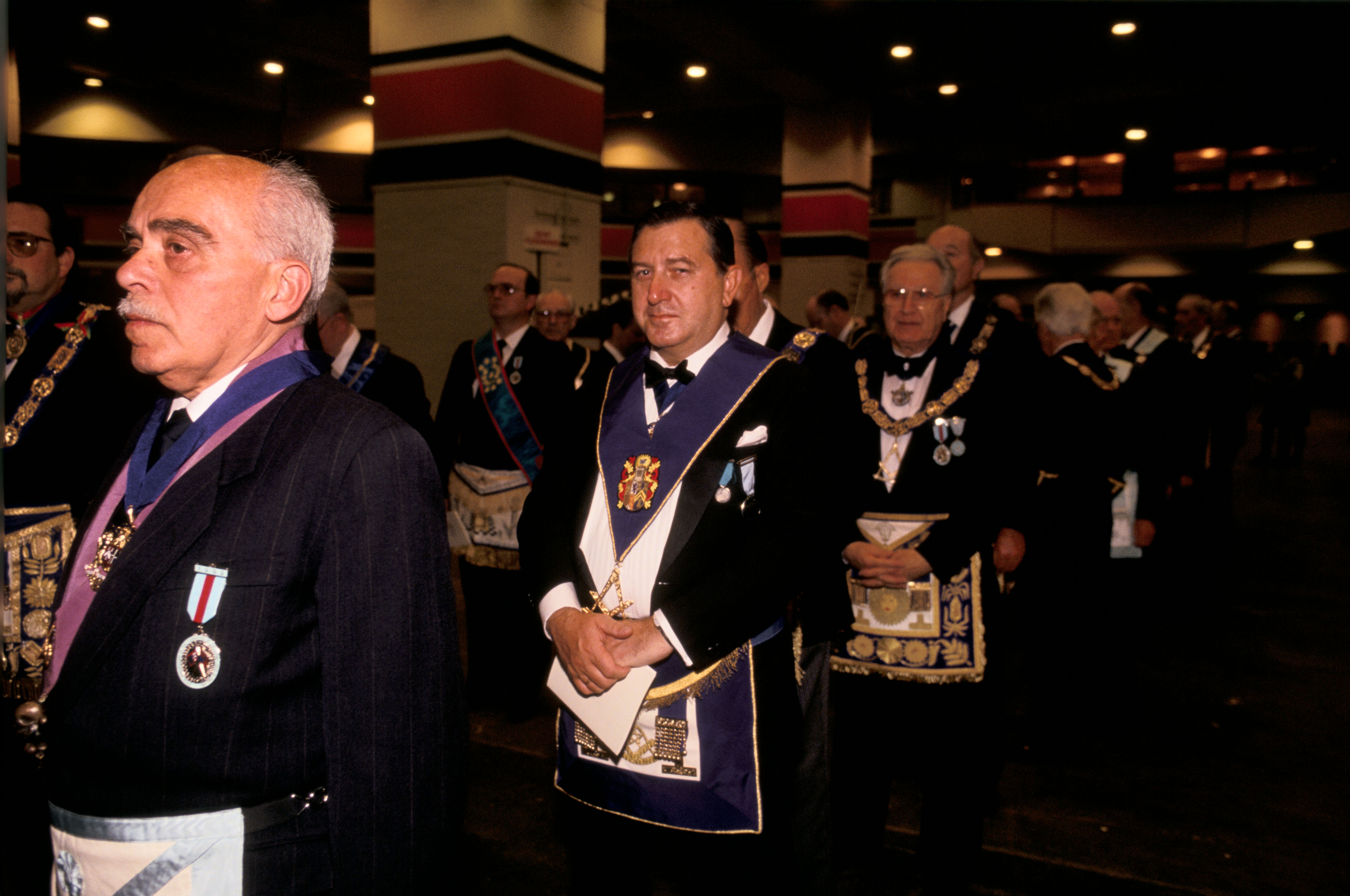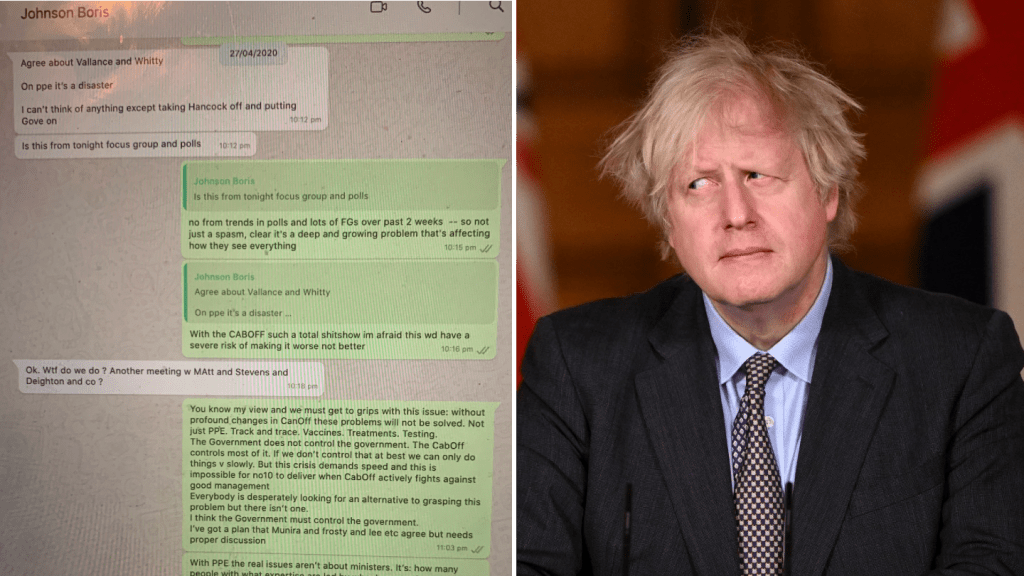The other day, for reasons I won’t attempt to explain, I found myself browsing the list of Twitter accounts followed by Michael Gove. Among the Conservative MPs, political commentators and Star Wars parody accounts, one jumped out at me: the Surrey Freemasons.
I stopped scrolling, then noticed others: Freemasons’ Hall; Freemasonry Today; the United Grand Lodge of England. Gove followed no less than eight accounts linked to Freemasonry. Is Michael Gove a Freemason, I wondered, or just really interested in Freemasonry?
Videos by VICE
Politics and Freemasonry have long been closely aligned. The organisation itself is apolitical, and discussion of politics at Masonic meetings is supposed to be off limits, but plenty of politicians have also been Freemasons, including Winston Churchill and no less than 14 US presidents.
Discerning the extent to which Freemasons are currently represented in the House of Commons, however, is no easy matter. British MPs are not required to disclose their membership. In 2018, the Guardian reported the existence of two Masonic lodges in the Houses of Parliament. At the time, the United Grand Lodge of England – the governing body for Freemasons in England and Wales – declared that no MPs were members of those lodges, but confirmed several MPs were Freemasons.
Could Gove be one of them? I call his parliamentary office, but there’s no answer. I wonder if he’s busy taking part in some strange Masonic ritual – then remember parliament is in recess and his office staff are probably just at home. I send an email instead, then turn my attention to identifying other Masonic politicians.
The United Grand Lodge of England has more than 32,000 Twitter followers, Gove among them. An analysis of those followers quickly reveals two other serving MPs: Gary Sambrook and Jack Lopresti.
Sambrook and Lopresti, both Conservatives, have spoken openly about Freemasonry. In 2018, Sambrook told Birmingham Live: “I have never made a secret of the fact that I am a Mason, and proudly tell anyone who asks.” Likewise, in 2012, asked why he declared his Freemasonry membership while he was a local councillor, Lopresti said: “I was proud to actually say I was a Freemason.”
Unfortunately, neither Sambrook nor Lopresti seem keen to speak about it now. Emails and calls – and a Twitter message to Sambrook – all go unreturned. It’s rather strange. Why would these proud Freemasons be so reluctant to talk about the organisation?
Finally, I find an MP who’s happy to answer questions about Freemasonry by email. Sir Bob Neill became a Mason in the mid-1970s and, while he never formally resigned, describes his membership as “lapsed” and says he has not been active for more than 30 years.
“Given that my active involvement ceased long before I became an MP, it has not affected or influenced my work as an MP at all,” he tells me. “I do not have any strong view as to whether declaration of membership of organisations such as the Freemasons should be compulsory or not. I do not have any problem being open about my past involvement, because I can see no reason not to be, but that is a personal view.”

My enquiries with MPs about Freemasonry have limited success, so I try the organisation itself. Freemasonry’s reputation as a shadowy network of the global elite has prompted countless conspiracy theories about its influence. Over the last couple of decades, the United Grand Lodge of England has taken steps to dispel this negative image, inviting members of the public to tour Masonic buildings and highlighting the organisation’s charitable work. Still, several interview requests made by email and telephone go unanswered (the public relations manager eventually texts, after a stated deadline has passed, to offer an interview the following week).
If I want to understand the Freemasons’ influence on British politics, it looks like I’ll have to consult some outside experts. In 1999, parliament’s Home Affairs Committee published a report on Freemasonry in Public Life. The committee concluded there is a “great deal of unjustified paranoia about Freemasonry”, but also found “there are cases where allegations of improper masonic influence may well be justified”, and called for public servants to be required to disclose membership.
Efforts to impose this requirement have since been unsuccessful, however, not least because the European Court of Human Rights has since ruled that a similar policy in Italy amounted to discrimination.
Chris Mullin, the former Labour MP who chaired the Home Affairs Committee at the time, tells me he still supports the recommendation. “It cannot be right that public servants or businessmen competing for public contracts can be members of a secret society, one of whose aims is mutual self-advancement,” he says. Mullin stresses that much of the suspicion around Freemasonry remains unfounded, but adds: “Until there is transparency, however, the Masons have only themselves to blame for the suspicion and resentment that their activities generate.”
I call John Dickie, an author and academic known for his work on the Sicilian mafia. When we speak, he’s just published The Craft, a book detailing Freemasonry’s 400-year history. Dickie says it’s hard to generalise, but he takes a dim view of conspiracy theories.
In Britain, he says: “The Freemasons are totally harmless – and in fact they are a good thing.” Dickie sees mandatory disclosure of membership as a slippery slope: “Do they have to say which public school they went to, which university or Oxford college they went to, which tennis clubs they are members of, who their circle of close friends is?”
While I’m prepared to believe the Freemasons are largely harmless, I tell Dickie I have misgivings about elected officials joining secretive networks that inevitably give rise to suspicion. He explains that this gets to the heart of Freemasonry’s problem.
“When you tear away all the wrapping, what you actually get is some home truths about being a nice guy and helping other people,” he says. “The problem is this cult of secrecy that the Masons have, which will always attract trouble towards them.” That secrecy is a large part of the organisation’s appeal, he says: “Join the Masons; learn the secrets. It’s a great pitch.”
A couple of days after my first attempt to contact Gove, I call his constituency office in Surrey Heath. “I’m trying to find out if Michael is a Freemason,” I explain to the woman at the other end of the line. Unfortunately, she knows no more about Gove’s Masonic connections than I do.
A call to the Cabinet Office is similarly inconclusive. “Is Michael Gove a Freemason?” I ask a press officer. “We answer questions about policy,” he replies. “Not things like this.”
Further calls and emails to his parliamentary office go unreturned. Maybe Gove considers the question so ridiculous that it doesn’t justify a response. Or maybe he really is a member of the Freemasons – and is simply under no obligation to tell you or me about it.






